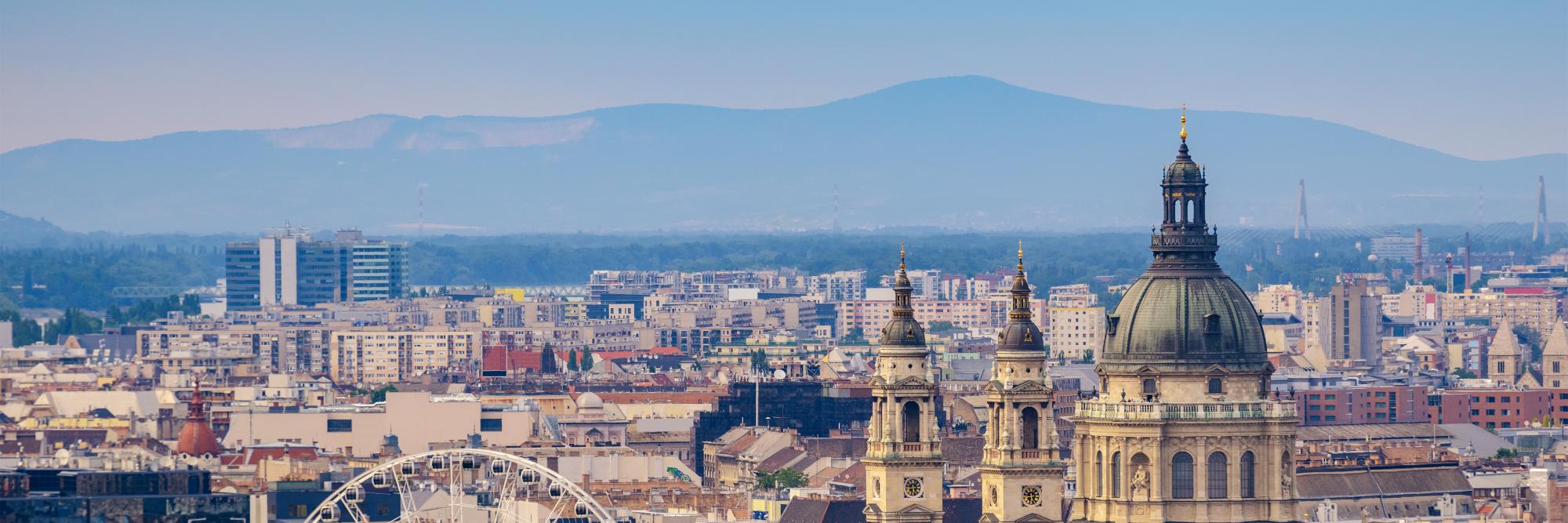Starr Varga, an American woman living in Hungary, moved to Budapest with her husband in 2017. Since then they've travelled extensively through both Europe and Hungary.
Working from her laptop, Starr can be found walking through the romantic Budapest streets or brunching in corner cafés. Read more about her exuberant and adventurous lifestyle on her blog, Black Girl in Budapest. Her blog is also a meticulously detailed guide for those seeking to visit or live in Budapest. For the more visually-minded, Starr also runs an Instagram account.
Read more about Hungary in the Expat Arrivals Hungary country guide or read more expat experiences in Hungary.
About Starr

Q: Where are you originally from?
A: I was born in NYC, raised in Charlotte, NC and have spent the last 10 years of my life in Los Angeles.
Q: Where are you living now?
A: Budapest, Hungary.
Q: When did you move to Hungary?
A: January 2017.
Q: Did you move here alone or with a spouse/family?
A: I moved here with my husband.
Q: Why did you move to Hungary?
A: My husband and I wanted to live in Europe to more easily and cheaply travel across the EU. He’s Hungarian, and so we thought that Hungary would be a good home base to both reconnect with his relatives and access the rest of Europe.
Living in Budapest
Q: What do you enjoy most about Budapest? How would you rate the quality of life compared to your home country?
A: I love Budapest. It's a big little city. There is so much to explore and see within the city limits and, as the public transport is so good, Budapest is also easy to navigate. There are so many great events in the city, from festivals and English comedy nights to expat mommy meetups. I’ve met all of my friends by attending events that interest me.
Q: Any negatives? What do you miss most about home?
A: I’m a vegetarian and Hungarian cuisine is very meat based, so I miss food from America. I find myself cooking more, which is not always fun. But going out to eat is an adventure, as the translated menus aren’t always accurate. I tend to order food that I thought was going to be prepared or look differently. That's why I always post about good restaurants when I find them.
Q: What are the biggest adjustments you had to make when settling into expat life in Hungary? Did you experience any particular elements of culture shock?
A: I’ve travelled within Europe before, so the culture shock wasn’t severe. The biggest adjustment was experiencing how slow life is in Hungary. I believe it's more of an Eastern European thing. Hungary feels about 20 years behind with most aspects of life. What would take one step to do in America, tends to take five steps here in Hungary, followed by a lot of paperwork, which seems wasteful to me. I’m used to a more digitally savvy lifestyle, so it throws me off that Hungary still uses so much paperwork.
Q: What’s the cost of living in Budapest compared to home? What is cheap or expensive in particular?
A: Groceries, museums and entertainment are relatively cheaper than in America. Although the average salary here is USD 1,000 per month, people can still afford to enjoy restaurants and the opera. Clothes and electronics are expensive. There is a 27 percent tax on these goods and the prices are already high, probably because they're imported.
Q: How would you rate the public transport in Budapest? What are the different options? Do you need to own a car?
A: There are many options for getting around this bustling city. Firstly, I love public transportation. You can cheaply get anywhere in the city with various options including trams, buses, or the metro. When the weather is nice, I tend to walk as the city is beautiful to look at. Instead of using taxis, I use Bolt which is like Uber and is the most trustworthy way to take a taxi. When I need to purchase large items, or absolutely need the freedom to get from point A to point B I use a service called GreenGo, which allows you to rent a car by the minute. There is always a GreenGo car nearby. The app lets you unlock the car, drive to your destination, park on the street and leave it for the next person.
Q: How would you rate the healthcare in Budapest? Have you had any particularly good/bad experiences with regards to doctors and hospitals? Are there any hospitals you would recommend?
A: The pharmacies are great and can help in prescribing medication for colds and such. Many people have said that you should stay away from state hospitals as their care isn’t ideal. English is rarely spoken in state hospitals and they can be confusing to navigate. Private hospitals and clinics are great. They have English-speaking nurses and doctors and they offer packages for specific health visits throughout the year. Top private clinics include Firstmed, RMC, and Robert Karoly. There are more, but these are the ones that I know of. I’m with RMC and I love it. From pregnancy care, dentistry and paediatrics to general care, they offer extensive health services.
Q: What are the biggest safety issues facing expats living in Budapest? Are there any areas expats should avoid?
A: I've heard stories about taxis and landlords upping their prices for tourists. This is why I confide with my Hungarian cousins-in-law about local prices and use apps like transport Bolt, as the price is determined before you hop in a cab. This isn’t to say that everyone is doing this, but it’s something to be aware of. Budapest is a tourist city. Just like anywhere else in the world, there are going to be pickpockets and scam artists. I feel safe here. Of course, being street smart is key.
The biggest question I get is if Hungary is safe for black people. My answer is that yes, it is safe. There are black people that live in Budapest. I don’t see many every day, and maybe I’ll only see one a week, but there is a black community here from Africa, America and other parts of Europe. Yes, black people may get looks, but they're looks of curiosity and not hate, which I'm fine with. Most times, people couldn't care less.
Q: How do you rate the standard of housing in the Budapest? What different options are available for expats?
A: Most if not all rentals are furnished. There are many beautifully renovated rentals that were refurbished with expats in mind, meaning that their prices are much higher. You can find studio apartments for USD 300-400, but accommodation quality varies depending on what you're willing to pay. We literally moved with a list of must-haves and got everything we wanted.
Q: Which are the best places/suburbs to live in Budapest as an expat?
A: The city is split between the Buda and the Pest sides of the river. Everyone I know lives in the city centre, which is on the Pest side. With shops, nightlife and the potential for a view, living on the river is always great. The Buda side is quieter, which is where I live and I don't mind travelling the 10 minutes that it takes to get to the Pest side. If you live on the Buda side then stay as close to the river as you can. You usually don’t want to stay up in the hills as it can feel secluded. For the Buda side, I recommend Districts 1, 2, 3 and 12. For the Pest side, which is where most younger expats stay, I suggest Districts 5, 6, 7, 8 and 9 (the city centre).
Meeting people and making friends in Budapest
Q: How tolerant are the locals of foreigners? Is there any obvious discrimination against particular religions, women or identities?
A: There is a big split between generations. Locals under 30 most likely speak English and are tolerant of everyone. The older generations can be very unaccommodating.
Q: Was it easy meeting people and making friends in Budapest? How did you go about meeting new people?
A: Everyone learns about events in the city from Facebook. Budapest expats are big on it. I went to these events alone, introduced myself, and found friends very easily. There are also many interest-specific Facebook groups.
Q: Have you made friends with locals or do you mix mainly with other expats? What advice would you give to new expats looking to make friends?
A: I would say I have more expat friends. The locals who I’m friends with are family members, so I guess that doesn’t count. English Comedy night at Broady Studios is a great place to meet friends. International Meeting Point, an expat meetup event, happens at Anker’t, the ruin bar.
Family and children in Budapest
Q: Did your spouse or partner have problems adjusting to their new home? Do you think there are any specific challenges for a trailing spouse?
A: Meeting people made settling easier. Learning about our neighbourhood helped us feel more at home. We had to slow down and remind ourselves that things are different here.
And finally...
Q: Is there any other advice you would like to offer new expat arrivals?
A: Come with an open heart and a readiness to explore new cultures. Take advantage of Budapest's many events and immerse yourself in the city. Don’t forget there are beautiful towns and villages in the Hungarian countryside. Enjoy Budapest from day to night as there is so much to do and see.
~ Interviewed March 2018



